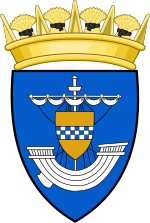Renfrewshire (historic)
| Renfrewshire | |
|---|---|
 Renfrewshire within Scotland |
|
| Area | |
| • 1975 | 245 sq. miles (634 sq. km) (27th) |
| Population | |
| • 2014 est | 346,470 |
| • 1981 est | 366,509 |
| History | |
| • Origin | Lordship of Strathgryfe |
| • Succeeded by | Strathclyde Region |
| Status |
Local government county (until 1975) Lieutenancy area Land registration county (1996 - ) |
| Chapman code | RFW |
| Government |
County: Renfrewshire County Council (1890-1975) Modern: East Renfrewshire Council, Inverclyde Council, Renfrewshire Council (1996 - ) Lieutenancy: Lord Lieutenant of Renfrewshire (1794 - ) |
| • HQ | Renfrew (county town) |
| • Motto | Avito viret honore ('Flourishing through ancestral honour') |
 Coat of arms of the county council |
|
Renfrewshire or the County of Renfrew (Latin: Praefectura Renfroana) is a historic county and lieutenancy area in the west central Lowlands of Scotland.
The area is occasionally known as Greater Renfrewshire to distinguish it from the modern local authority area. For the purposes of local government, Renfrewshire is now divided into three council areas called Renfrewshire, East Renfrewshire and Inverclyde.
The county borders the city of Glasgow and Lanarkshire to the east and Ayrshire to the south and west. The Firth of Clyde forms its northern boundary, with Dunbartonshire and Argyllshire on the opposing banks.
Renfrewshire's early history is marked by ancient British and Roman settlement. Renfrewshire can trace its origin to the feudal lands at Strathgryfe granted to Walter Fitzalan, the first High Steward of Scotland. Robert III of Scotland, a descendant of Fitzalan, established the shire of Renfrew-based out of the Royal burgh of Renfrew, the site of the House of Stuart's castle and Renfrewshire's county town.
...
Wikipedia
